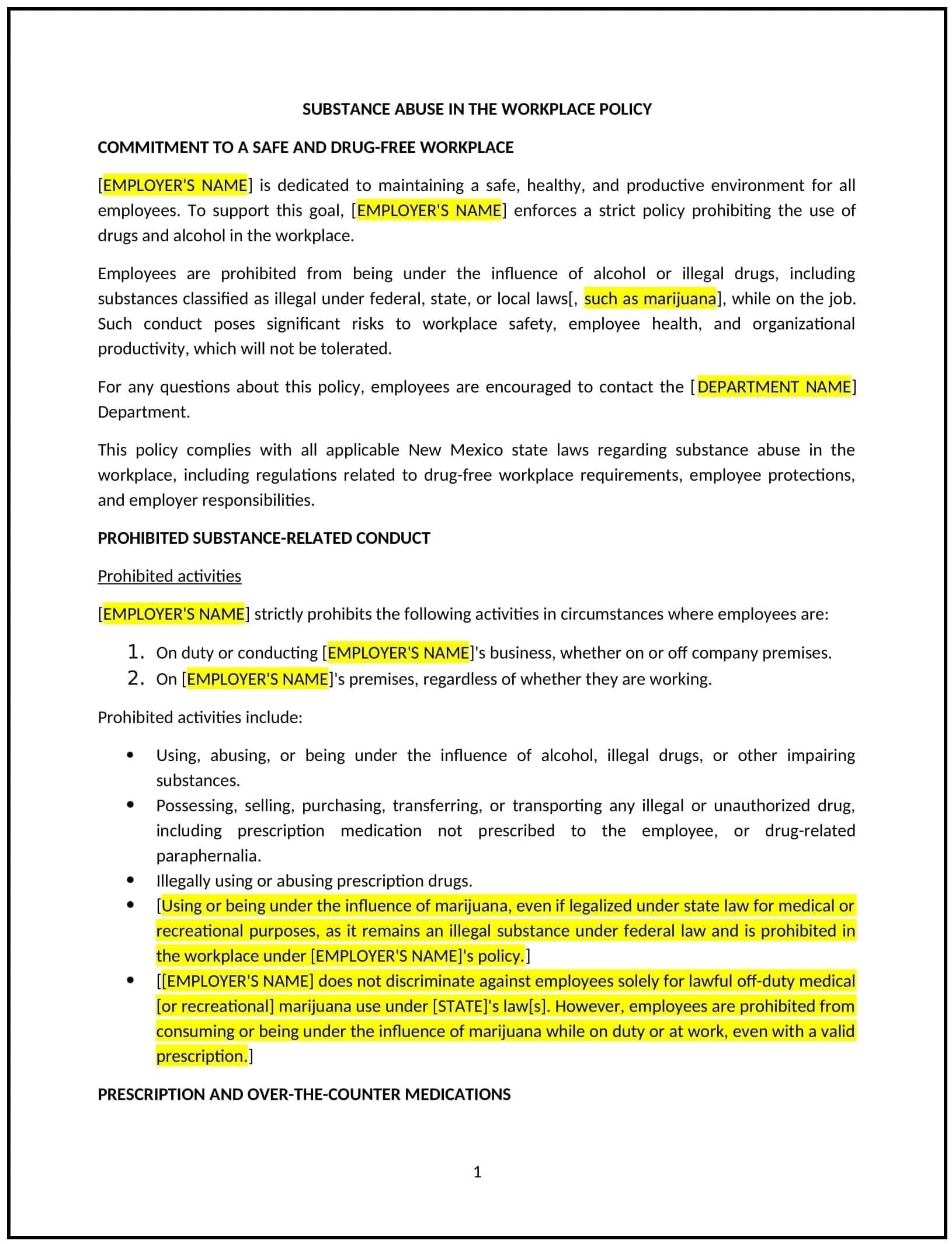Substance abuse in the workplace policy (New Mexico): Free template
Got contracts to review? While you're here for policies, let Cobrief make contract review effortless—start your free review now.

Customize this template for free
Substance abuse in the workplace policy (New Mexico)
This substance abuse in the workplace policy is designed to help New Mexico businesses create a safe and productive work environment by outlining expectations for employee behavior concerning the use of alcohol, drugs, and other substances. The policy addresses the company’s stance on substance abuse, the procedures for identifying and handling substance abuse issues, and the support available to employees dealing with substance-related problems.
By adopting this policy, New Mexico businesses can foster a healthier work environment, reduce risks related to substance abuse, and ensure that employees are aware of the resources available to them.
How to use this substance abuse in the workplace policy (New Mexico)
- Define substance abuse: Clearly define what constitutes substance abuse, including the use, possession, or distribution of illegal drugs, the misuse of prescription medications, or alcohol consumption that impairs job performance or violates workplace conduct standards.
- Establish clear expectations: Outline the company’s expectations regarding drug and alcohol use, including a zero-tolerance policy for substance abuse that affects job performance, safety, or workplace harmony.
- Set procedures for identifying substance abuse: Specify how substance abuse issues will be identified, such as through observation of behavior, performance issues, or results of drug testing (if applicable).
- Provide support options: Offer support for employees struggling with substance abuse, such as access to employee assistance programs (EAPs), rehabilitation, or counseling services. Encourage employees to seek help without fear of immediate discipline, while still maintaining expectations for job performance.
- Reflect New Mexico-specific considerations: Ensure the policy is aligned with New Mexico state laws regarding substance testing, employee rights, and drug-free workplace regulations. Consider New Mexico's medical marijuana laws and how they may impact the policy and its enforcement.
Benefits of using this substance abuse in the workplace policy (New Mexico)
Implementing this policy provides New Mexico businesses with several advantages:
- Promotes a safe workplace: Addressing substance abuse helps create a safer work environment by reducing risks associated with impaired performance, accidents, and injuries related to drug or alcohol use.
- Protects employee health: By providing support for employees with substance abuse problems, businesses can help improve their well-being and support recovery, which can enhance overall morale and employee satisfaction.
- Improves productivity: Employees who are free from substance abuse issues are more likely to be productive, reliable, and focused on their work, improving overall business performance.
- Reduces liability: A clear substance abuse policy can help businesses reduce legal risks related to substance abuse incidents in the workplace, particularly with regard to worker safety, accidents, or discrimination claims.
- Supports business continuity: Addressing substance abuse proactively can minimize disruptions to business operations, ensuring that employees perform their jobs safely and effectively, without substance-related issues affecting their work.
Tips for using this substance abuse in the workplace policy (New Mexico)
- Communicate the policy clearly: Ensure all employees understand the policy and its implications. Include it in the employee handbook and discuss it during onboarding. Provide regular training and reminders about the policy to reinforce its importance.
- Be consistent in enforcement: Ensure the policy is applied consistently across all employees, regardless of position or seniority. Apply the same standards for behavior and discipline to everyone to avoid perceptions of bias.
- Offer support for affected employees: Encourage employees who may be struggling with substance abuse to seek help through available resources, such as an EAP or external counseling services. The policy should emphasize support and rehabilitation over punitive measures when appropriate.
- Monitor the effectiveness of the policy: Regularly evaluate how well the policy is working, including tracking incidents related to substance abuse, assessing the use of support services, and gathering feedback from employees.
- Review the policy regularly: The policy should be reviewed at least once a year to ensure it remains aligned with New Mexico state laws, company culture, and industry best practices. Adjustments may be needed as laws and employee needs change.